MINERAL RESOURCES & ECONOMIC GEOLOGY
Mineral resources are a mainstay of Nevada's economy from before statehood to the present. The Comstock silver discovery put Nevada on the global mining stage. Since 1961, Nevada gold discoveries have fueled the largest and longest-lived boom in U.S. gold mining. In addition, Nevada is a leading producer of geothermal energy and the only producer of lithium in the U.S. The state also produces more than a dozen other commodities on a large scale, making it the largest producer of non-fuel minerals in the country for the past several years.
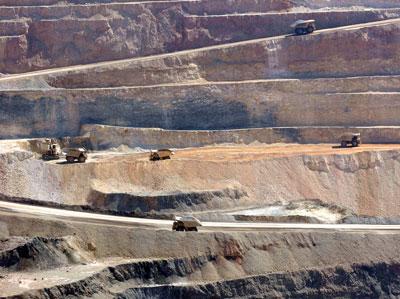
Mineral Resources
Nevada is diverse in its natural resources and leads the nation in the value of non-fuel minerals that it produces, which in 2017 amounted to about $8.5 billion. Major commodities produced include gold, silver, lithium, copper, geothermal energy, barite, gypsum, diatomite, and aggregate. The Nevada Bureau of Mines and Geology contributes to Nevada's diversified resources through geologic mapping of resource areas, by determination of a region's resource potential, and by conducting applied research that aids in our understanding of the conditions and locations in which mineral deposits form.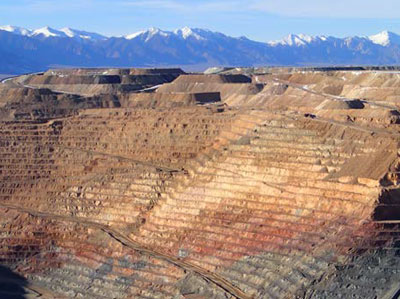
Gold Continues to Shine
Nevada is a world leader when it comes to gold production, ranking 4th in 2017 among global jurisdictions-the three higher ranking areas are countries: China, Australia, Russia, of which Nevada comprises a mere 4% in terms of landmass. Nevada's gold production in 2017 amounted to 5.6 million ounces, or nearly 6% of world production, and worth approximately $7.1 billion. The majority of gold is mined from Nevada's unique Carlin-type gold deposits that occur in belts such as the famous Carlin trend in northeastern Nevada. In addition, about 20% of Nevada's gold comes from other regions of the state. NBMG's geologic mapping and research of mining districts in Nevada are a basis for mineral companies seeking to initiate exploration activities, and its research is pushing the limits on understanding the science behind Nevada’s outstanding mineralendowment.
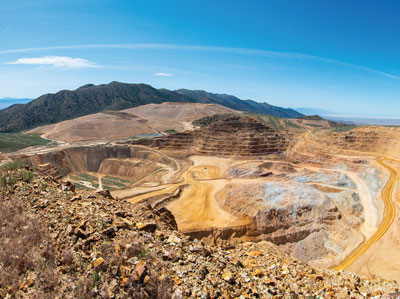
Not All That Glitters in Nevada
is Gold
one of the world's largest unmined molybdenum resources at Mount Hope near Eureka.
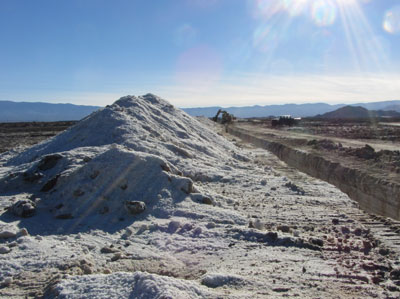
Energy for a Changing World
Energy metals, lithium and vanadium, are poised to figure brightly in Nevada's diversifying natural resource portfolio. Nevada continues to be America's only producer of lithium at Clayton Valley and also has the largest lithium clay deposit in the world at McDermitt, currently being developed by Lithium Americas Corp. New mapping and research by NBMG geologists is aiding lithium exploration at McDermitt and other areas of Nevada. Vanadium, which is a major component of long-storage flow batteries, is actively being explored in parts of eastern Nevada, and large resources have already been delineated.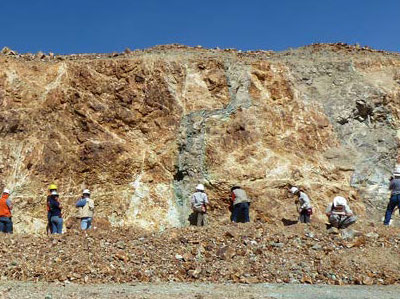
Ralph J. Roberts Center for Research in Economic Geology:
Preparing Nevada's Workforce for the Discovery and Development of Nevada's Future Mineral Resources
NBMG faculty lead the graduate program in economic geology at UNR and train students in the geology of mineral deposits. Most of their research is through the Ralph J. Roberts Center for Research in Economic Geology (CREG), which is housed within NBMG and is a partnership between the Mackay School of Earth Sciences and Engineering, the Nevada mining industry, and the U.S. Geological Survey. These partners pool their resources to fund research that is fundamental to understanding mineral deposits and aids discoveries and production of mineral deposits. Most of CREG's graduates gain employment in the Nevada mineral industry and some go on to do research
and train the
next generation of economic geologists.

 Home
Home